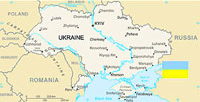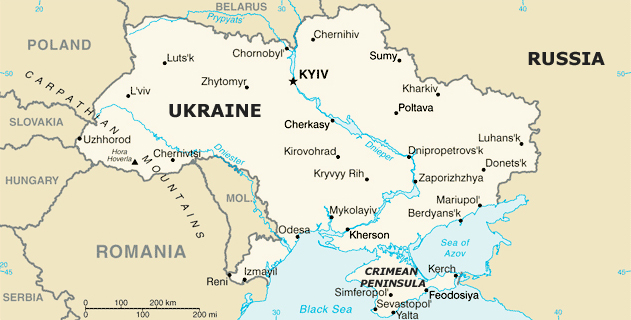Business New Europe: Ukraine seeks power and coal from Russia and rebel-held east

(Business New Europe – bne.eu – bne IntelliNews – December 5, 2014) Kyiv has started talks with Russia as well as with Russian-backed rebels in East Ukraine in order to source electric power and coal, as Ukraine’s national grid faces a critical shortage of fuel, Ukraine’s new energy minister Volodymyr Demchyshyn said on December 4.
Demchyshyn said that Ukraine is in talks over imports of coal and electric power from Russia, despite this being politically undesirable. “This is necessary, however politically difficult,” he said. “Coal needs to be brought in from wherever possible,” Demchyshyn said.
Ukraine is running out of coal because of the ongoing conflict in East Ukraine, the source of the rare anthracite coal much of Ukraine’s power generation capacities require, as well as dwindling hard currency reserves needed to finance fuel imports.
Some voices predicted imminent loss of heating to the capital, Kyiv, since coal-fuelled power generators also supply heat. “If power stations don’t quickly switch feedstock to gas and fuel oil, Kyiv will freeze in the coming days,” wrote Sevgil Musaeva-Burovik, respected editor of leading paper Ukrainskaya Pravda.
State-owned power and heat generator Tsentrenergo, which operates major thermal power stations for Kyiv, Kharkiv and Donetsk, announced on December 4 that its Smiisvka thermal power station in Kharkiv region had closed one of its power blocks due to lack of coal. According to figures cited by Musaeva-Burovik, Tsentrenergo’s coal stocks have fallen to less than 5% of their level in August 2014.
Ukraine’s national grid operator Ukrenergo, announced on December 4 that it would continue rolling power outages nationwide, in order to cut power usage between the hours of 8am-11am and 4pm to 22pm by 2116 megawatts.
At the same time as negotiating with Russia over power and coal supplies, Kyiv is negotiating with the Russian-backed rebels in Donbas over sourcing coal from state-owned mines, in exchange for continuing to supply power and gas to the rebel-held territories.
Russia may be reluctant to alleviate Kyiv’s energy woes, since Moscow wants Kyiv to source coal from the Russian-backed rebels in East Ukraine, rather than from Russian companies, so that Kyiv provides financial support to the rebel-held territories.
Demchyshyn backed this option on December 5. “This is not about buying coal from terrorists. This is Ukrainian coal and in Ukrainian mines. As soon as the possibility arises of exporting it [from rebel-held territories] I am certain the problem will be solved,” Demchyshyn said, adding that there was 2mn tonnes of coal waiting for transport stored in rebel-held territories.
The National Bank of Ukraine is also believed to support this move, because payments to the rebels could be made in hryvnia, whil any imports would have to be paid from Ukraine’s scarce hard currency reserves. Demchyshyn, the new energy minister, is a longstanding partner and colleague of NBU head Valeriya Gontareva in their private sector careers prior to their new governmemt posts, and the two are expected to coordinate their actions closely.
“The Russian side is forcing the Ukrainian government to do business with the separatists controlling the occupied territories of Donbass, who should be involved in the delivery of this coal to central Ukraine. Yet it will be hard for Ukrainian government to justify such a deal to the public,” wrote Concorde Capital’s Oleksandr Paraschiy.
Demchyshyn also asked Ukrainians to cut energy usage by 15%. “Please, take it seriously. We expect reductions in electricity consumption even today. If we see consumption fall … I promise to appeal to stop the outages,” Demchyshyn said in a press release on December 4.
Demchyshyn, only appointed as energy minister on December 2, asked industrial companies to work at night, offering price rebates for power supplied if they did so. He also said on December 5 he would work with regional authorities to negotiate voluntary cuts in consumption.
Demchyshyn held a meeting on December 4 with the US ambassador to Ukraine Geoffrey Pyatt and head of the EU delegation to Ukraine Jan Tobinski on December 4 to discuss the power crisis.
Adding to Ukraine’s woes, a malfunction at a nuclear power plant on November 28 led to one reactor being taken off line. Nuclear power accounts for around 50% of Ukraine’s power generation. State nuclear power operator Energoatom said that the reactor would be back on line on December 5.
The rolling daytime power outages are increasing in frequency across Ukraine, from Lviv in West Ukraine to Kharkiv in East Ukraine, and including Kyiv, according to media reports. Outages are targeted primarily at industry, office buildings, and public transport. But housing is also affected where housing districts are supplied by the same power lines as industrial plants, according to media reports.
Ukraine is also running through its gas reserves during the cold snap, since Russia has not supplied gas since June 2014. Demchyshyn said on December 4 that Ukraine would make advance payment to Russia for 1bn cubic meters of gas “by the end of the week”.
Ukraine’s largest gas consumers, its fertiliser producers, are now finding their gas supplies have been switched off. Rivneazot, owned by oligarch Dmitry Firtash, was due to have its feedstock supply switched off on December 3, in compliance with government regulations prohibiting supplies of gas from Ukraine’s underground storage to chemical plants, according to a press release

